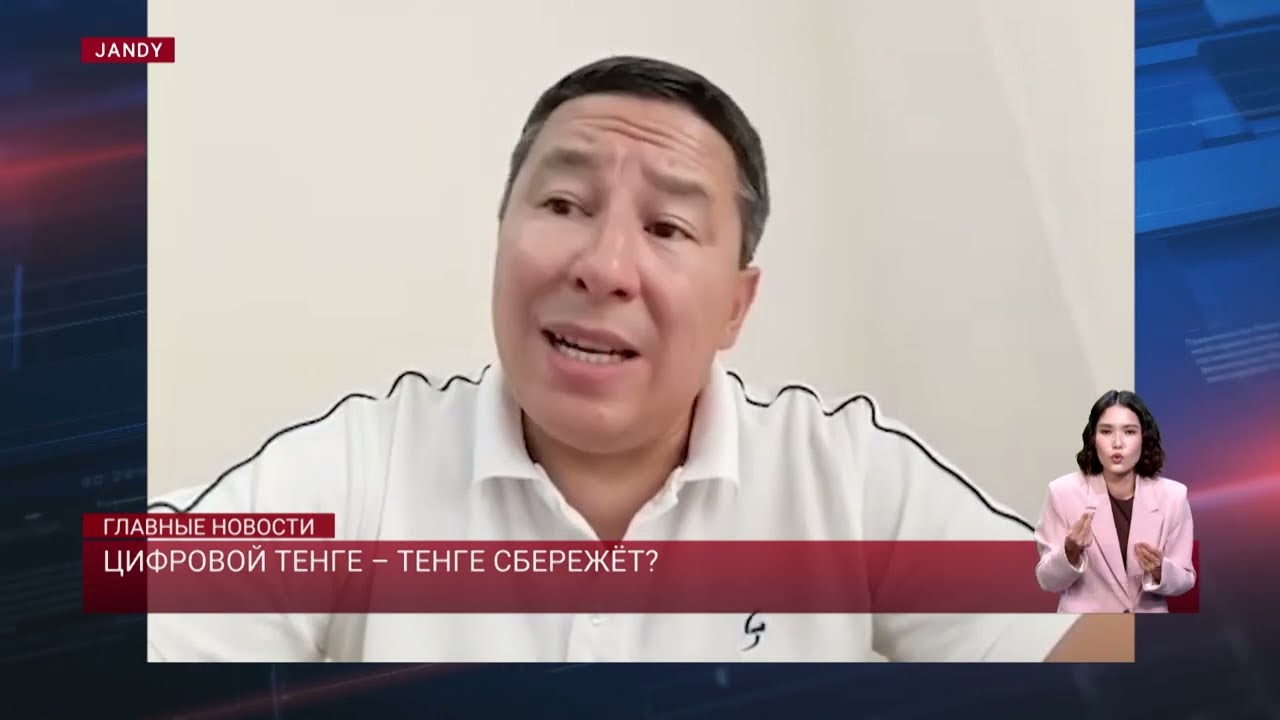eGov's Witnesses
Financial analyst Andrey Chebotarev considers digitalization projects to have transformed our lives.
"Digitalization in terms of eGov has allowed companies to remotely open accounts, provide services, spawned a number of startups such as Kaspi and Freedom, developed online brokerage, online banking. These are actually cool products.
I also consider the Khorgos projects and the launch of the Western Europe–Western China corridor to be progressive. Otherwise, I don't see anything super-disruptive that can be called the project of the decade," the source said.
Financier Murat Temirkhanov also noted digitalization and the development of not only the public services market, but also the private sector as a result of it.
"The government and second-tier banks have created really advanced things through eGov and database integration. The other day I was leaving the hotel, and there was a foreigner standing next to me at the reception. He complained that it was not visible through his banking application in his mobile phone, whether they had withdrawn /not withdrawn and how much money was from the account. For us, this is yesterday.
From the point of view of informatization, there are still problems, but we have already done a big job," the financier believes.
In addition, he considers it necessary to shift the interests of Kazakhstan from Russia to China.
"I have always been concerned about the high dependence on the Russian Federation, but now we are diversifying the economy, and this dependence is decreasing. The war in Ukraine has shown that there are many risks associated with the Russian Federation – geopolitical, economic. These events helped us to see certain problems, and if Russia used to be the main trading partner, now China is becoming one. Although, if we look at it comprehensively, then this is Europe," Temirkhanov clarified.
He also listed a number of points in the "new" Kazakhstan, which, in his opinion, can be attributed to positive processes.

Murat Temirkhanov - Financier, Advisor to the Chairman of the Board of Halyk Finance JSC
"This is an increase in multi-vector foreign policy, which reduces geopolitical risks for Kazakhstan. Increased attention to the development of the country's transit potential (railway, auto, air, pipelines). More attention is paid to state financing of education, medicine and science," the expert said.
Financial consultant Rasul Rysmambetov, in turn, noted: the best projects in Kazakhstan can be divided into two parts - structural and own, income-related.
"Of the structural projects, the main one, of course, is the launch of e-government and the PSC network, which have greatly facilitated the work of not only individuals, but also the corporate sector.
In second place, we can note the transit of Western China - Western Europe, which allowed us to practically implement our plans. Thousands of trains pass this route every year and allow us to learn how to service them.
Among our own projects, we should mention the launch of the production of Knauf building materials, the launch of a number of cement plants," Rysmambetov shared.
Fintech and 4G
The head of Kursiv Research, economic observer Sergey Domnin grouped initiatives and projects that can be considered successful in two directions.
"The first direction is technological, and here success is most obvious. The first project is the development of fintech by private players. In the last 10 years, Kazakhstan's financial sector has largely completed the transformation from an industry filled with conservative credit, deposit, insurance and other institutions to the fintech sector.
Today, an exhaustive set of financial services has been digitized, and we see how seriously this stimulates growth not only in conventional banking, but also, for example, in retail investment, where the number of clients of brokerage companies grew at double-digit rates," the source emphasized.
The second project is the implementation of the e-government function. eGov has significantly simplified the lives of millions of Kazakhstanis by converting essential services to digital format, and with the advent of Digital ID, citizens' relations not only with the state, but also with financial institutions, companies and even utility providers have been simplified, Domnin continued.
The third is the country's 4G mobile coverage. Without this infrastructure, the successes of Kazakhstan's fintech and govtech would not be so impressive. The value of fourth-generation communication became obvious during the quarantine restrictions during the coronavirus pandemic, the expert is sure.
He called the launch of the industrial phase of Kashagan development the fourth breakthrough topic.

Sergey Domnin - Head of Kursiv Research
"The most technologically complex and capital-intensive project of the century on the shelf of the Northern Caspian Sea was launched for the second time in the last decade. This project will be the most important factor in the sustainability of the economy of the Republic of Kazakhstan for the coming decades," believes Sergey Domnin.
The fifth is the completion of the modernization of key refineries. The main result of this project is the completion of a series of traditional annual fuel crises and greater self–sufficiency of the domestic fuel market. However, problems in the fuel sector remain, the source added.
"The sixth is the new redevelopment of the nuclear industry. In 2021, production was launched at the subsidiary of Kazatomprom and the Chinese CGNPC Ulba-TVS, which produces fuel assemblies and their components for nuclear power plants in China. This is really a technological breakthrough for the Republic of Kazakhstan, which allows us to accumulate competencies for the final completion of the nuclear fuel cycle in the country," Domnin said.
Privatization, industrialisation, human capital and the EAEU
The second direction, which he highlighted in the comment, is the rules of the game.
"The second wave of privatization. It is important not only that over the years about 1,000 enterprises of the state and quasi-public sectors have been transferred to the private sector, but also the fact that officials and managers of state-owned companies recognize the importance of the boundaries of participation in industry markets, beyond which they should not go.
The next item is the state industrial programs. These programs have made it possible to systematize and combine the efforts of the public, quasi-public and private sectors of the economy of Kazakhstan around the task of economic modernization. The effectiveness of such a policy is evidenced by the dynamics of labor productivity in the manufacturing industry ahead of other industrial sectors and the steady increase in the level of economic complexity of the Kazakh economy," the economic observer stressed.
He called the ninth breakthrough project an increase in public investment in human capital.
"Recent reforms in the education sector and healthcare have been quite controversial, but their important result has been an increase in spending on sectors that make a decisive contribution to the formation of human capital. The effect of additional expenses on raising teachers' salaries, building new schools, and financing the social health insurance system is not obvious in a short period, but it will manifest itself in the next 10-20 years," the expert believes.
And finally, he called the EAEU the tenth project.
"The Eurasian Economic Union was originally a Kazakh initiative, however, its implementation was delayed for almost 20 years, as it was not immediately supported by the political leadership of two other important participants – the Russian Federation and Belarus.
Economic integration in the post-Soviet space has not been developing without problems over the past 10 years, and in the last few years it has been experiencing serious external pressure. However, the creation of a common market for goods, services, capital and labor in 2014 made it easier for thousands of domestic companies to do business and simplified the lives of millions of citizens of Kazakhstan," the source said.
Simplification and a quiet revolution at customs
The head of the NGO "DESHT" Kuanysh Zhaikov agrees with his colleagues.
"Among the successful projects, I can single out Kazakhstan's FinTech. I single it out separately because it has affected the lives of almost all Kazakhstanis, including ordinary rural ones. The economic consequences of this phenomenon are only being studied, but it has thrown us to another level of development, contrary to the institutional track," the economist noted.
 Kuanysh Zhaikov - economist, head of NGO "DESHT"
Kuanysh Zhaikov - economist, head of NGO "DESHT"
The second is the digitalization of urban services. She is in second place because she has less penetration.
"We are talking about the taxi industry, couriers, C2C sales, GIS platforms and much more. This is a tangible improvement in the quality of life, as well as civilized work for hundreds of thousands of citizens.
The third is eGov and the digitalization of the state as a whole. It is clear that many government services were already free or cost minimal before that. But the savings in time and nerves, translated into money, are enormous. The State has not only provided equal access to services, but also increased self-confidence. Anyone who remembers the process of obtaining basic documents 20 years ago understands what it is about," Zhaikov said.
The fourth process he specified simplified business modes.
"We initially implemented a very complex fiscal system based on the "best international experience". As expected, neither the people nor the bureaucracy were ready for this.
But the introduction of simplified regimes after that led to a tremendous growth of micro and small businesses. Yes, there was a fragmentation, but it allowed to legalize a lot of small entrepreneurs, to bring them out of the "shadow". It is clear that at some point this system will have to be changed, but it was a good intermediate institution," the economist believes.
The fifth breakthrough project, according to the expert, is a quiet revolution at customs, when a few years ago the authorities set about clearing these Augean stables.
"One reform at the customs – the removal of barriers, corruption and crime – gave 300 billion tenge to the budget "clean", including VAT on imports only and only for a year.
To understand the scale: due to this reform, in just 1 year it is possible to finance schools for 100 thousand children or the entire national project "Modernization of rural health care" with 655 facilities or modernization of CHP-2 in Almaty. By the end of 2025, only this reform will cover half of the budget of the national project "Comfortable Schools"," DESHT analysts wrote in 2022.
In total, in the mentioned year, customs officers collected 3.3 trillion tenge, which is equivalent to the entire budget of the education sector, from kindergartens to universities.
"It is also noteworthy that foreign trade has become more competitive and accessible. The number of participants increased by 2 times during the year - from 28.8 to 44.5 thousand.
The ways to achieve these indicators clearly characterize the importance of institutional solutions: remote monitoring without contact with participants has been introduced. Customs officers are separated from decision-making, the system independently distributes declarations and determines the risk," DESHT recorded two years ago.
The capacity at border checkpoints with China has increased 4 times; online exchange of export declarations with China has been established: if earlier we tracked only 17% of imports, now it is another 80% transported by rail.
"Shadow schemes have been eliminated not only with China, but also with Turkey. For example, the efficiency of collecting payments from consumer goods has increased almost 4 times.
3 times more violations were detected than in 2021. Penalties to the state budget increased from 51 to 182 billion tenge.
We do not know what the status of the "revolution" is now, but at its start we were surprised, because customs was one of the most corrupt and criminal spheres, which many reforms were broken into.
The rest is debatable, time will tell. A lot is being done well, but so far it does not pull for a big successful case at the country level," Kuanysh Zhaikov summed up.
Kashagan and Astana hub
Economist Askar Kysykov considers the development of the largest Kashagan field, launched in 2016, to be a great successful project.

Kashagan
field "This was preceded by large-scale investment, technological, and production work. About $55 billion has been invested in the project. The volume of production last year was about 19 million tons.
Now Kashagan plays a serious role in oil production and replenishment of budget revenues. The Ministry of Energy of the Republic of Kazakhstan sued the developers - the main investors of the field - demanding compensation for lost profits of more than $ 150 billion.
Even if we ignore this proceeding (perhaps there is a real reason for disputes), the deposit is large and has a serious impact on the country's economy," said Kysykov.
In addition, among the successful projects in the oil industry, he named the modernization of all 3 refineries – Atyrau, Pavlodar, Shymkent, which "made it possible to fully provide Kazakhstan with its gasoline and diesel fuel and produce fuel according to the Euro-5 standard
" The list continues the creation of the Astana Hub technopark, where a special preferential tax regime for IT companies operates and their startups. A whole ecosystem has been introduced here, in fact it is a new industry for the republic. Currently, 1,400 companies operate in Astana Hub, and the export of services exceeds half a billion dollars.
In the medium term, we will increasingly hear that innovative companies in Kazakhstan will appear from the Astana hub," the economist shared his opinion.
He called "One Belt, One Road" another successful initiative. The initiative, as we remember, is Chinese, supported by Kazakhstan.
 Khorgos Dry Port, Altynkol railway station
Khorgos Dry Port, Altynkol railway station
Over $35 billion has been invested in the development of transit traffic from China to Europe for 15 years, the Khorgos dry port, the Western Europe - Western China highway, the corridor from China to Iran have been launched, the logistics center of the Republic of Kazakhstan in China has been built.
Accordingly, the effect of transit traffic in Kazakhstan will increase. KTZ earns serious sums through transit, and this, I think, is one of the most promising areas of the country's economic development," the expert said.
NICHE, mortgage and NPP
He also mentioned social initiatives, for example, the creation of "Nazarbayev Intellectual Schools". Currently, there are 21 schools in each region of the country.
"The high quality of education in NIS has allowed us to create a serious social lift for talented children. recent graduates of these schools are already entering the labor market.
This project allows not only to directly prepare children, but also to guide updated educational methods to other schools. Such a good competence center," the economist noted.
He also highlighted another initiative of the first president – the mortgage program "7-20-25".
"The mortgage here was very simple, understandable to citizens, many families who needed their first housing received it under this program. And it still works. More than 70 thousand loans have been issued – that is, about 70 thousand families have purchased a roof over their heads.
In this aspect, we can note the Otbasy Bank, in general, the ZHSSB system, which I assess as successful. I got my first apartment myself thanks to a mortgage through the Housing and Communal Services. This is a good tool for citizens who are working or unable to buy square meters at market prices, those who are in socially vulnerable categories, on waiting lists," the source said.
At the end of the conversation, he also called the creation of the National Chamber of Entrepreneurs "Atameken" an effective project.
"This is a unique institution created according to the continental model, with mandatory membership of all entrepreneurs in the organization. At the beginning, the NCE acted as an important institution balancing the government. In
those political conditions, it was a good initiative that allowed businesses to have the right to vote on many issues, including improving the investment climate and the tax environment.
At that time, the EAEU was being organized, and NCE actively participated in the negotiation process. Many colleagues from the Russian Federation and the Republic of Belarus envied our entrepreneurs who had a direct influence on government decisions.
The interests of business were really taken into account then, many reforms were carried out at the initiative of NCE. On a number of controversial issues, the Chamber competently and constructively opposed the government. And many bad decisions were not made thanks to the NPP.
Now the chamber is in a serious crisis. A transformation was announced until it happened. In any case, a decision should be made on the further work of the NCE. But it was during its formation that the organization played an important role in the economic development and business development of the country," Askar Kysykov believes.
No breakthroughs, no failures
Political scientist, author of the encyclopedia "Who's who in Kazakhstan" Daniyar Ashimbayev, unlike previous speakers, failed to name 10 successful projects of the country due, as he believes, to their absence.
"The history of eGov and PSC began more than 10 years ago. There are not many new breakthrough industries in the economy, and sluggish diversification has been going on for many years. Logistics is developing, but we have eternal problems with roads. The railway is currently being reconstructed, but these are not new tracks, but an extension of existing highways.
No new oil, gas, or uranium deposits have been discovered, there are no new promising interesting construction projects – this is generally a gray topic," the political scientist commented on his opinion to us.
The fact that we defeated the coup attempt in January 2022 is good, Ashimbayev continued, on the other hand, we also allowed it.
"We coped with those events, but with external help. And the participation of law enforcement agencies in the coup, which were the organizers, left a black spot on the political history of Kazakhstan," the political scientist stressed.
 Daniyar Ashimbayev is a political scientist, author of the encyclopedia "Who's Who in Kazakhstan"
Daniyar Ashimbayev is a political scientist, author of the encyclopedia "Who's Who in Kazakhstan"
, the country is developing quite stably, there are no interethnic conflicts, he stated.
"We have no clear breakthroughs if we take the dynamics over 10 years. Although there are no obvious failures. New banks, new quasi–holdings - the majority of Kazakhstanis are not interested in this. There are no new industries, no scientific discoveries. QazVac many citizens tried not to get vaccinated.
The Constitution has been changed, but this is a reaction to previous constitutional changes. New models of informing the parliament have been introduced, but this was done on the basis of previous forms," the political scientist continued.
In terms of political development, there has been a change of power - a precedent for Kazakhstan after 30 years of the rule of the first president, Ashimbayev continued.
"The process ended after 3 years, and it was very painful. The absence of interethnic conflicts inside and outside military conflicts against today's background is already good. We initially had a multi-vector foreign policy.
In fact, these are the three main values from which Kazakhstan began to build Independence, and so far it holds them. In some points we stand still, but maybe it's for the best," the author of the encyclopedia "Who's Who in Kazakhstan" shared his opinion.
Last year, he recalls, national projects were canceled. Even earlier, national programs.
"But no one has even reported on the achievements. New regions were created - in place of previously abolished ones, new ministries were opened, but the same Ministry of Emergency Situations, for example, existed until 2014. Something has been updated in the management system, but much of the new is well-forgotten old," Daniyar Ashimbayev noted.
And he also recalled that 10 years ago there was a devaluation of the tenge.
"We do not close food supplies on the domestic market, the country's municipal infrastructure is worn out. UNT is far from an achievement, but a dead-end branch of evolution: instead of developing creative thought, they switched to cramming.
The public procurement system changes every quarter. There was a message the other day. that a new investor is entering the phosphorus industry. But this industry has already developed successfully in the 60s. We are still building the fourth refinery, the fourth conversion - where is it? We have increased oil exports, but according to the OPEC+ quota, we must reduce production so that prices do not fall further," the political scientist noted.
Return of capital and personal assessment
Our last interviewed speaker is a political scientist, head of the Central Asian Foundation for the Development of Democracy Tolganai Umbetalieva. The expert personally felt the benefits of digitalization, which she named among the successful processes.
"For example, getting places in kindergartens. Now it is very conveniently done, you can decide for yourself when to send it to kindergarten. To do this, if you have already put a child in the queue, you can track the available places. As soon as you choose a kindergarten, you immediately receive a referral from the mayor's office. You don't waste time visiting the mayor's office and arguing with employees. All at once. It was very convenient for me personally. Therefore, this is the number one project.
The second is to obtain rights if the term is coming to an end. It can be done in a very short time. It used to take a whole day, sometimes two. Now it is very convenient," Tolganai said.
The third is a change for the better in the service in children's clinics.
"The state is watching the child very closely. If you call the pediatrician home, then several times they call back from different authorities and ask if the pediatrician was with you and if you are satisfied with the medical service.
I can't single out any political projects yet, only note the return of capital. The project has not been completed, so I cannot talk about success. The recruitment system for government agencies is not yet transparent.
In the field of science, we can note the allocation of finances for long-term scientific projects, as a result, we now see a large number of new scientific literature prepared by Kazakhstani scientists," the political scientist said.
And which top 10 projects do you consider breakthrough for the country and its residents? And what new products do we need?
Write to us and we will discuss it.
Author: НАЗГУЛЬ АБЖЕКЕНОВА
Source: https://taj.report/10projects



